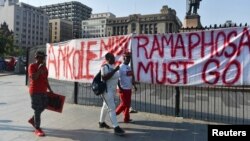Police and soldiers deployed across South Africa Monday as the country braced for protests after a left-wing party called for a "national shutdown", sparking fears of a repeat of unrest that turned deadly two years ago.
There was a heavy security presence at the Union Buildings, the seat of government in Pretoria, where demonstrators were expected to protest later.
The country's third-largest party, the Economic Freedom Fighters (EFF), has urged South Africans to take to the streets and bring the country to a halt.
Authorities said they were on high alert to prevent and fight any acts of criminality and maintain public order. Parliament announced that President Cyril Ramaphosa had authorized the deployment of 3,474 soldiers to assist police.
"We hope that those that will be marching, as long as they will be doing so peacefully, we have no reason to interfere with them," police minister Bheki Cele told reporters in Johannesburg on Monday.
"Police will have to be tough without really being brutal," he said, adding that private security companies were also helping police.
At least 87 protestors were arrested for violence-related offences overnight.
Pretoria and Johannesburg streets were quiet Monday morning, with few cars driving through the normally busy streets.
Most shops were closed with their shutters down, and one Pretoria auto dealership had removed all vehicles from its shop windows.
The protest call rekindled memories of the deadly riots of July 2021, the worst violence since the end of apartheid in South Africa, when at least 350 people were killed in protests sparked by the jailing of ex-president Jacob Zuma spiraled into riots and looting.
Ramaphosa has ordered law enforcement agencies to ensure there no repeat of the 2021 unrest.
In his weekly Monday newsletter, he said any person or organization was free to call protests, "but no-one should be forced, threatened or intimidated into joining that protest".
The EFF is demanding Ramaphosa's resignation over his handling of South Africa's economic weakness, chronic electricity shortages and high unemployment.
'We are tired'
The party has told protesters their actions "must be militant and radical" but to behave "peacefully" and watch out for "agent provocateurs" attempting to hijack the strike.
"No one can stop a revolution," EFF leader Julius Malema told supporters on Friday.
EFF spokesman Sinawo Tambo told AFP that concerns over looting and violence were "baseless" and accused the authorities of using excessive force by deploying the army in a bid to intimidate supporters.
In Pretoria, EFF member Gift Boquopane, 42, joined the protest with his wife and children.
"They don't do anything for us," Boquopane said of the government. "We are tired of load shedding," he added, a reference to the electricity blackouts, echoing the "Down with Loadshedding" on the sign he was carrying.
A 27-year-old fitness enthusiast, who declined to give her name, said she supported the protest because the power outages had seriously disrupted businesses.
"I'm in support of it, but I'm not in support of things that happen during protests. All the stealing, all the tarnishing of properties," she said as she skipped rope with a friend on the lawns south of Ramaphosa's office.
South Africa's economic growth tumbled below pre-pandemic levels in the last three months of 2022.
The country has been battered by high unemployment, soaring inflation and the waves of blackouts caused by breakdowns and capacity shortfalls at state energy provider Eskom.
Ramaphosa last week suggested that Malema was trying to gain political prominence ahead of national elections next year.
On Saturday, a Johannesburg court ordered the EFF not to shut down schools, stores, businesses, trade and public roads with the protest, and not to incite violence, after South Africa's leading opposition party, the Democratic Alliance (DA), asked it to prohibit the protest.
"The EFF has every right to protest, but the party has no right to hold South Africa hostage in doing so," DA leader John Steenhuisen said.




